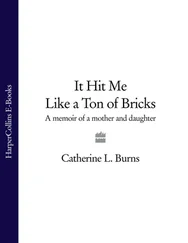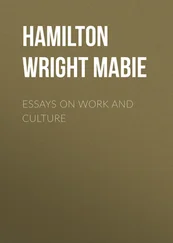Youngest of all the Blanton boys was Uncle Gary. He was the baby of the family and one of the sweetest men I knew. Uncle Gary left home young and built a successful roofing business in Indiana. A good husband and a better father, he’d always say to me, “We’re proud of you, ole Jaydot,” causing me to swell with pride. He was my favorite, the only Blanton brother not to threaten me with a kick in the ass or a detached ear.
My grandma also had two younger sisters, Betty and Rose, whom I loved each very much, but I was obsessed with the Blanton men. I would sit among them and beg them to tell and retell their stories. These men were the gatekeepers to the family’s oral tradition, and I was their best student.
Most of this tradition was far from child appropriate. Almost all of it involved the kind of violence that should land someone in jail. Much of it centered on how the county in which Jackson was situated—Breathitt—earned its alliterative nickname, “Bloody Breathitt.” There were many explanations, but they all had one theme: The people of Breathitt hated certain things, and they didn’t need the law to snuff them out.
One of the most common tales of Breathitt’s gore revolved around an older man in town who was accused of raping a young girl. Mamaw told me that, days before his trial, the man was found facedown in a local lake with sixteen bullet wounds in his back. The authorities never investigated the murder, and the only mention of the incident appeared in the local newspaper on the morning his body was discovered. In an admirable display of journalistic pith, the paper reported: “Man found dead. Foul play expected.” “Foul play expected?” my grandmother would roar. “You’re goddamned right. Bloody Breathitt got to that son of a bitch.”
Or there was that day when Uncle Teaberry overheard a young man state a desire to “eat her panties,” a reference to his sister’s (my Mamaw’s) undergarments. Uncle Teaberry drove home, retrieved a pair of Mamaw’s underwear, and forced the young man—at knifepoint—to consume the clothing.
Some people may conclude that I come from a clan of lunatics. But the stories made me feel like hillbilly royalty, because these were classic good-versus-evil stories, and my people were on the right side. My people were extreme, but extreme in the service of something—defending a sister’s honor or ensuring that a criminal paid for his crimes. The Blanton men, like the tomboy Blanton sister whom I called Mamaw, were enforcers of hillbilly justice, and to me, that was the very best kind.
Despite their virtues, or perhaps because of them, the Blanton men were full of vice. A few of them left a trail of neglected children, cheated wives, or both. And I didn’t even know them that well: I saw them only at large family reunions or during the holidays. Still, I loved and worshipped them. I once overheard Mamaw tell her mother that I loved the Blanton men because so many father figures had come and gone, but the Blanton men were always there. There’s definitely a kernel of truth to that. But more than anything, the Blanton men were the living embodiment of the hills of Kentucky. I loved them because I loved Jackson.
As I grew older, my obsession with the Blanton men faded into appreciation, just as my view of Jackson as some sort of paradise matured. I will always think of Jackson as my home. It is unfathomably beautiful: When the leaves turn in October, it seems as if every mountain in town is on fire. But for all its beauty, and for all the fond memories, Jackson is a very harsh place. Jackson taught me that “hill people” and “poor people” usually meant the same thing. At Mamaw Blanton’s, we’d eat scrambled eggs, ham, fried potatoes, and biscuits for breakfast; fried bologna sandwiches for lunch; and soup beans and cornbread for dinner. Many Jackson families couldn’t say the same, and I knew this because, as I grew older, I overheard the adults speak about the pitiful children in the neighborhood who were starving and how the town could help them. Mamaw shielded me from the worst of Jackson, but you can keep reality at bay only so long.
On a recent trip to Jackson, I made sure to stop at Mamaw Blanton’s old house, now inhabited by my second cousin Rick and his family. We talked about how things had changed. “Drugs have come in,” Rick told me. “And nobody’s interested in holding down a job.” I hoped my beloved holler had escaped the worst, so I asked Rick’s boys to take me on a walk. All around I saw the worst signs of Appalachian poverty.
Some of it was as heartbreaking as it was cliché: decrepit shacks rotting away, stray dogs begging for food, and old furniture strewn on the lawns. Some of it was far more troubling. While passing a small two-bedroom house, I noticed a frightened set of eyes looking at me from behind the curtains of a bedroom window. My curiosity piqued, I looked closer and counted no fewer than eight pairs of eyes, all looking at me from three windows with an unsettling combination of fear and longing. On the front porch was a thin man, no older than thirty-five, apparently the head of the household. Several ferocious, malnourished, chained-up dogs protected the furniture strewn about the barren front yard. When I asked Rick’s son what the young father did for a living, he told me the man had no job and was proud of it. But, he added, “they’re mean, so we just try to avoid them.”
That house might be extreme, but it represents much about the lives of hill people in Jackson. Nearly a third of the town lives in poverty, a figure that includes about half of Jackson’s children. And that doesn’t count the large majority of Jacksonians who hover around the poverty line. An epidemic of prescription drug addiction has taken root. The public schools are so bad that the state of Kentucky recently seized control. Nevertheless, parents send their children to these schools because they have little extra money, and the high school fails to send its students to college with alarming consistency. The people are physically unhealthy, and without government assistance they lack treatment for the most basic problems. Most important, they’re mean about it—they will hesitate to open their lives up to others for the simple reason that they don’t wish to be judged.
In 2009, ABC News ran a news report about Appalachian America, highlighting a phenomenon known locally as “Mountain Dew mouth”: painful dental problems in young children, generally caused by too much sugary soda. In its broadcast, ABC featured a litany of stories about Appalachian children confronting poverty and deprivation. The news report was widely watched in the region but met with utter scorn. The consistent reaction: This is none of your damn business. “This has to be the most offensive thing I have ever heard and you should all be ashamed, ABC included,” wrote one commenter online. Another added: “You should be ashamed of yourself for reinforcing old, false stereotypes and not giving a more accurate picture of Appalachia. This is an opinion shared among many in the actual rural towns of the mountains that I have met.”
I knew this because my cousin took to Facebook to silence the critics—noting that only by admitting the region’s problems could people hope to change them. Amber is uniquely positioned to comment on the problems of Appalachia: Unlike me, she spent her entire childhood in Jackson. She was an academic star in high school and later earned a college degree, the first in her nuclear family to do so. She saw the worst of Jackson’s poverty firsthand and overcame it.
The angry reaction supports the academic literature on Appalachian Americans. In a December 2000 paper, sociologists Carol A. Markstrom, Sheila K. Marshall, and Robin J. Tryon found that avoidance and wishful-thinking forms of coping “significantly predicted resiliency” among Appalachian teens. Their paper suggests that hillbillies learn from an early age to deal with uncomfortable truths by avoiding them, or by pretending better truths exist. This tendency might make for psychological resilience, but it also makes it hard for Appalachians to look at themselves honestly.
Читать дальше
Конец ознакомительного отрывка
Купить книгу
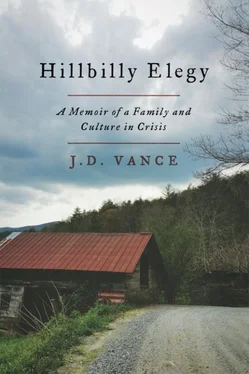
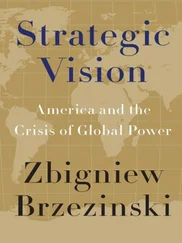

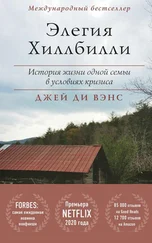
![Джей Вэнс - Элегия Хиллбилли [litres]](/books/399146/dzhej-vens-elegiya-hillbilli-litres-thumb.webp)





